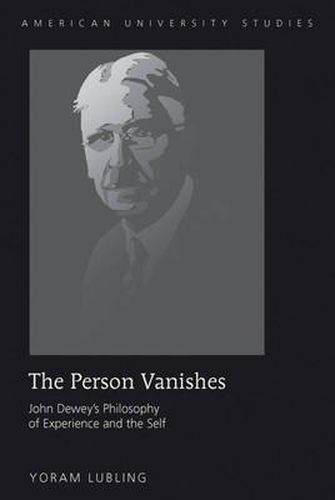Readings Newsletter
Become a Readings Member to make your shopping experience even easier.
Sign in or sign up for free!
You’re not far away from qualifying for FREE standard shipping within Australia
You’ve qualified for FREE standard shipping within Australia
The cart is loading…






This title is printed to order. This book may have been self-published. If so, we cannot guarantee the quality of the content. In the main most books will have gone through the editing process however some may not. We therefore suggest that you be aware of this before ordering this book. If in doubt check either the author or publisher’s details as we are unable to accept any returns unless they are faulty. Please contact us if you have any questions.
The Person Vanishes argues that despite John Dewey’s failure to articulate an adequate theory of personality , his writings provide at least a theory-sketch of human personality consistent with the assumptions that framed his philosophical outlook. Recognizing the new developments in society, science, and the arts, Dewey argues for the necessity of a Copernican revolution in our understanding of the human self; from the monadic and minimalist self of the Cartesian-Newtonian modernist tradition to a relational and processual model of selfhood consonant with the press of post-modernist historical experience. As a field and activity conception, Dewey’s self emerges as a nexus of relational energizing, genuinely moored in a cultural surrounding in which ongoing creative reconstruction becomes the mark and criterion of the self’s health and growth. What vanishes in Dewey’s reconstruction is not the self as such, but only the entitative, substantive self of early modernism.
Dewey’s understanding of the self is grounded in the conviction that philosophy must begin its inquiry from the ordinary experience of plain men and women. The Person Vanishes examines Dewey’s participatory notion of deliberation, what he calls dramatic rehearsal , by using the Israeli-Palestinian conflict as a case study. The analysis attempts to cash out the personal and collective habits, as well as the different modalities of ends, facts, and values that diagram the existential dimensions of this problematic situation. Contrary to traditional dualistic and spectatorial accounts of deliberation, Dewey’s dramatic rehearsal shows the complexity of decision-making when the genuine limitations of daily life are taken seriously. The attempt to march to Dewey’s participatory philosophy reveals the escapist nature of all dualistic philosophical traditions and the reason for their continuous failure to resolve concrete social and personal conflicts.
$9.00 standard shipping within Australia
FREE standard shipping within Australia for orders over $100.00
Express & International shipping calculated at checkout
This title is printed to order. This book may have been self-published. If so, we cannot guarantee the quality of the content. In the main most books will have gone through the editing process however some may not. We therefore suggest that you be aware of this before ordering this book. If in doubt check either the author or publisher’s details as we are unable to accept any returns unless they are faulty. Please contact us if you have any questions.
The Person Vanishes argues that despite John Dewey’s failure to articulate an adequate theory of personality , his writings provide at least a theory-sketch of human personality consistent with the assumptions that framed his philosophical outlook. Recognizing the new developments in society, science, and the arts, Dewey argues for the necessity of a Copernican revolution in our understanding of the human self; from the monadic and minimalist self of the Cartesian-Newtonian modernist tradition to a relational and processual model of selfhood consonant with the press of post-modernist historical experience. As a field and activity conception, Dewey’s self emerges as a nexus of relational energizing, genuinely moored in a cultural surrounding in which ongoing creative reconstruction becomes the mark and criterion of the self’s health and growth. What vanishes in Dewey’s reconstruction is not the self as such, but only the entitative, substantive self of early modernism.
Dewey’s understanding of the self is grounded in the conviction that philosophy must begin its inquiry from the ordinary experience of plain men and women. The Person Vanishes examines Dewey’s participatory notion of deliberation, what he calls dramatic rehearsal , by using the Israeli-Palestinian conflict as a case study. The analysis attempts to cash out the personal and collective habits, as well as the different modalities of ends, facts, and values that diagram the existential dimensions of this problematic situation. Contrary to traditional dualistic and spectatorial accounts of deliberation, Dewey’s dramatic rehearsal shows the complexity of decision-making when the genuine limitations of daily life are taken seriously. The attempt to march to Dewey’s participatory philosophy reveals the escapist nature of all dualistic philosophical traditions and the reason for their continuous failure to resolve concrete social and personal conflicts.